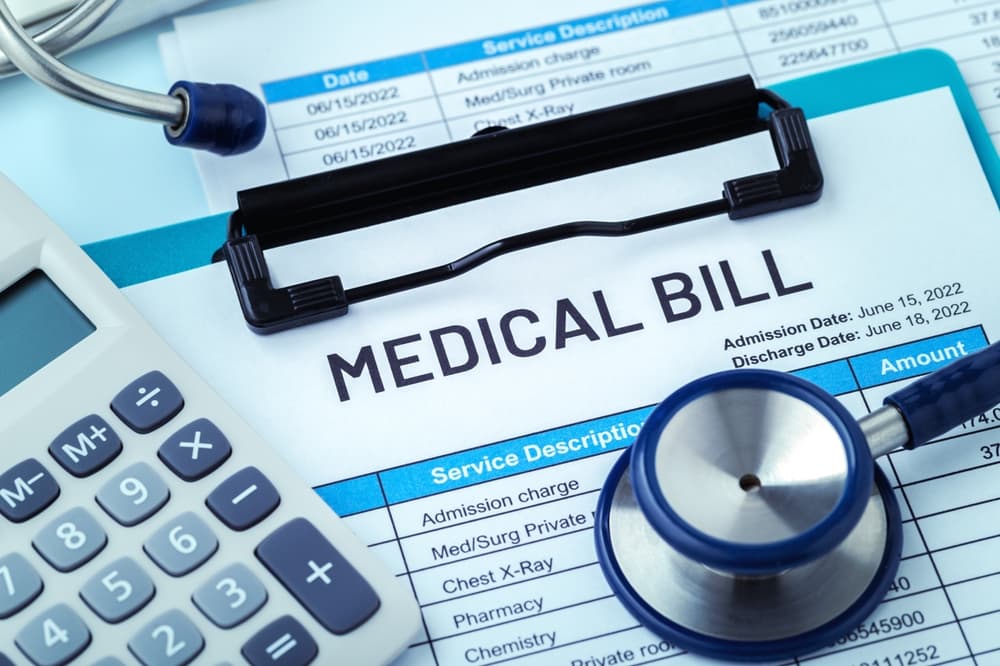
After a car accident, the physical and emotional recovery is challenging enough without the added stress of medical bills arriving in your mailbox. In Pennsylvania, the question of who pays medical bills in a car accident is often more complex than people realize, but the initial answer is usually your own car insurance policy, regardless of who was at fault. This is because Pennsylvania is a “no-fault” state, a system designed to get your immediate medical needs covered quickly.
However, this is just the beginning of the story. The costs of recovery can quickly surpass the limits of your initial coverage, leaving you to wonder what comes next. Knowing the layers of insurance coverage, the difference between your policy options, and your rights to seek compensation from the driver who caused the crash is crucial for protecting your financial future.
 When you hear that Pennsylvania is a “no-fault” state, it doesn’t mean that no one is ever held responsible for causing a crash. It simply refers to how medical bills are paid right after the accident. The system is designed to prevent long delays in getting medical treatment by making your own insurance company the first source of payment.
When you hear that Pennsylvania is a “no-fault” state, it doesn’t mean that no one is ever held responsible for causing a crash. It simply refers to how medical bills are paid right after the accident. The system is designed to prevent long delays in getting medical treatment by making your own insurance company the first source of payment.
This is handled through a part of your auto insurance policy called Personal Injury Protection, or PIP. The core idea is that you shouldn’t have to wait for the insurance companies to spend months arguing about who was at fault before your doctor’s bills can be paid.
According to Pennsylvania’s Motor Vehicle Financial Responsibility Law, all drivers are required to carry this coverage to ensure that medical care is accessible immediately following a collision.
Your Personal Injury Protection coverage is the first resource you will turn to when figuring out who pays medical bills after a car accident. In Pennsylvania, every auto insurance policy must include a minimum of $5,000 in PIP medical benefits. While you can purchase higher limits—and it’s often a good idea to do so—this is the baseline amount available to you.
PIP benefits are incredibly helpful because they can be used to pay for a wide range of necessary medical treatments and related costs. These benefits are available to you, your family members, and any passengers in your vehicle who might not have their own auto insurance.
Here are some of the expenses typically covered by PIP:
These benefits provide an essential safety net in the days and weeks immediately following an accident, ensuring that your path to recovery can begin without delay.
While $5,000 may sound like a lot of money, it can be exhausted quickly, sometimes after a single trip to the emergency room. A serious accident, perhaps on a busy road like Route 22 heading into Johnstown or near the campus in State College, can easily result in medical costs that far exceed the minimum PIP limit. So, who pays the medical bills after your PIP is used up?
This is where the next layer of coverage comes into play. Once your PIP benefits are exhausted, your private health insurance will typically become the primary payer for your medical treatment. You will need to submit your bills to your health insurance company, and you will be responsible for any deductibles, co-pays, or out-of-pocket maximums associated with your plan.
It’s important to keep detailed records of all payments made by both your auto insurance and your health insurance. This documentation will be vital if you decide to pursue a claim against the at-fault driver to recover those costs.
Just because your own insurance pays first doesn’t mean the at-fault driver is off the hook. The no-fault system is for immediate medical payments. For long-term costs, pain and suffering, and other damages, you have the right to hold the responsible driver accountable. The ability to do this, however, depends on a critical choice you made when you purchased your auto insurance: “Limited Tort” or “Full Tort.”
Choosing the “Limited Tort” option can save you a small amount on your monthly insurance premiums, but it significantly restricts your right to sue for certain types of damages. With Limited Tort, you can always seek compensation from the at-fault driver for all of your economic losses. These are tangible costs that can be calculated, such as:
What you give up with Limited Tort is the right to sue for non-economic damages, commonly known as “pain and suffering,” unless you have sustained what the law defines as a “serious injury.”
Under Pennsylvania law, a serious injury is a personal injury resulting in death, serious impairment of body function, or permanent serious disfigurement. Proving a “serious injury” can be a complex and challenging legal battle.
If you selected the “Full Tort” option, you retain the unrestricted right to sue the at-fault driver for all of your damages, including pain and suffering, regardless of the severity of your injury. You do not have to meet the “serious injury” threshold. This option provides a much broader path to securing fair compensation that truly reflects the total impact the accident has had on your life, from the physical pain to the emotional distress and loss of enjoyment of life.
While the premiums are slightly higher, the “Full Tort” option provides invaluable protection and leverage in the event of an accident.
In a perfect world, every driver would have enough insurance to cover the harm they cause. Unfortunately, that’s not always the case. According to the Insurance Research Council, more than one in seven drivers on the road is uninsured. So, who pays if the at-fault driver has no insurance or a policy that isn’t large enough to cover your extensive damages?
This is where two other crucial parts of your own auto policy can help:
UM and UIM coverage are not automatically included in every Pennsylvania policy, but insurance companies are required to offer them. Opting for this coverage is a powerful way to protect yourself and your family from the irresponsible actions of other drivers, whether you’re navigating the truck-heavy traffic on Route 119 near DuBois or just running errands in your hometown.
 If your health insurance company pays for your accident-related medical treatment, they don’t simply absorb that cost forever. Most health insurance policies contain a clause for “subrogation” or a “right of reimbursement.” In plain English, this means they have a legal right to be paid back from any money you recover in a settlement or verdict from the at-fault party.
If your health insurance company pays for your accident-related medical treatment, they don’t simply absorb that cost forever. Most health insurance policies contain a clause for “subrogation” or a “right of reimbursement.” In plain English, this means they have a legal right to be paid back from any money you recover in a settlement or verdict from the at-fault party.
This creates what is known as a “lien” against your settlement. For example, if your health insurer paid $50,000 for your medical care, they will place a $50,000 lien on your settlement. Before you receive your money, that lien must be satisfied.
Dealing with subrogation claims can be complicated. Insurance companies often demand full repayment, but an experienced personal injury attorney can often negotiate with the health insurer to reduce the amount of the lien. This is a critical step because reducing the lien puts more of the settlement money in your pocket, where it belongs, to help you pay for your other expenses and move forward with your life.
Here are answers to some other common questions that arise when determining who pays medical bills after a car accident in Pennsylvania.
If you were driving as part of your job duties when the accident occurred, your claim may involve a workers’ compensation case in addition to a car accident claim. Workers’ compensation insurance would typically be the primary payer for your medical bills and a portion of your lost wages. You may still be able to file a claim against a negligent third party (the at-fault driver) for damages not covered by workers’ comp, such as pain and suffering.
In Pennsylvania, the time limit for filing a personal injury lawsuit, known as the statute of limitations, is generally two years from the date of the accident. If you miss this deadline, you will likely lose your right to seek compensation in court forever. It is very important to act promptly to protect your legal rights.
You should be very cautious when speaking to an insurance adjuster from the other driver’s company. Their job is to minimize the amount their company has to pay. It is often advisable to avoid giving a recorded statement or accepting a quick settlement offer before you fully understand the extent of your injuries and your legal rights. You can politely tell them you will have your attorney contact them.
A car accident can leave you dealing with injuries, doctors’ appointments, and the constant worry about how to pay for it all. At Marcus & Mack, we are a part of your community, and our mission is to help people like you during the most difficult times of their lives.
With over 100 years of combined experience, our attorneys understand Pennsylvania’s insurance laws and know how to build a strong case to pursue the full compensation you deserve. We will handle the insurance companies, investigate your accident, and fight to ensure your present and future needs are met.
Whenever you call—24 hours a day, 365 days a year—you will speak with a caring person who is ready to listen. Because helping injured people isn’t just something we do, it’s all we do.
Contact us today at (724) 349-5602 or through our online form for a free case consultation. You pay no attorney fees unless we recover money for you. Let us help you change your life for the better.
Marcus & Mack
